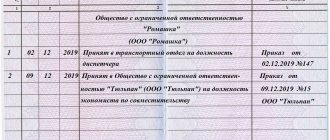An employment contract is the main document that regulates the labor relationship between a medical organization and a medical employee. On the Internet you can easily find “samples” of such an agreement - unfortunately, most of them are not of the best quality and can cause a lot of troubles and legal complications. Therefore, you should not treat its conclusion too lightly, as some kind of formality. Any shortcomings can result in lost legal disputes, financial losses and a damaged reputation for the employer. In our article, we talk in detail about each clause of the employment contract with a medical worker, advise the wording that should be chosen and remind you of what you should never forget.
Parties to the employment contract
The employer's side is represented by a medical organization licensed to carry out medical activities. The employment contract is signed on her behalf by the manager or another person authorized by her (for example, a deputy manager acting on the basis of a power of attorney).
A medical professional acts on the employee’s side. The number of health workers includes persons who have a medical or other special education, provide professional medical care or carry out other medical activities in a medical organization, or an individual entrepreneur directly engaged in medical activities (subclause 13 of Article 2 of the Law “On the Fundamentals of Protecting the Health of Citizens in the Russian Federation " dated November 21, 2011 No. 323-FZ).
Medical personnel are divided into categories in accordance with the order of the Ministry of Health of the Russian Federation dated December 20, 2012 No. 1183n):
- Doctors (specialists with higher medical education).
- Experts (specialists with higher non-medical education - biologists, medical physicists, forensic experts, psychologists, etc.).
- Nursing staff (specialists with secondary medical education): paramedics, midwives, nurses.
- Junior medical staff: orderlies, nurse-housewives, orderlies-drivers.
It should be borne in mind that employees of medical organizations carrying out exclusively administrative and economic activities, including the majority of junior medical personnel, are not considered medical workers and their work is regulated on a general basis, without any special features. For example: driver, office cleaners, etc.
However, the mere fact of having a special medical education when applying for a medical job is not enough. Before concluding an employment contract with him, the employer must ensure that the applicant meets all of the following conditions:
- Availability of a specialist certificate or certificate of accreditation (clause 1 of Article 100 of the Law of November 21, 2011 No. 323-FZ “On the fundamentals of protecting the health of citizens in the Russian Federation”, Order of the Ministry of Health of Russia of December 22, 2017 No. 1043n “On approval of the terms and stages of accreditation of specialists , as well as categories of persons with medical, pharmaceutical or other education and specialists subject to accreditation”).
- Successfully passed a medical examination and the absence of medical contraindications for engaging in medical activities (Part 2 of Article 213 of the Labor Code of the Russian Federation, Article 34 of the Law “On the Sanitary and Epidemiological Welfare of the Population” dated March 30, 1999 No. 52-FZ).
- No criminal record or criminal prosecution (for doctors working with minors) (Article 351.1 of the Labor Code of the Russian Federation).
- Admission to work with narcotic and psychotropic substances (in cases where this is necessary for a given medical specialty).
Please note that doctors and nurses undergo medical examinations at the direction of the employer and at his expense (Part 2 of Article 213 of the Labor Code of the Russian Federation). The procedure for preliminary and periodic medical examinations is regulated in detail by Order of the Ministry of Health and Social Development of Russia dated April 12, 2011 No. 302n “On approval of lists of harmful and (or) hazardous production factors and work, during which mandatory preliminary and periodic medical examinations (examinations) are carried out, and the Procedure for conducting mandatory preliminary and periodic medical examinations (examinations) of workers engaged in heavy work and work with harmful and (or) dangerous working conditions.”
To obtain permission to work with narcotic and psychotropic substances, the head of the medical organization issues a referral to the medical worker for a medical examination and psychiatric examination, and also sends a request to the internal affairs bodies about the absence of outstanding or unexpunged convictions for crimes of moderate gravity, serious and especially serious crimes, or crimes related to drug trafficking, or charges of such crimes. The procedure for admission to work with narcotic drugs and psychotropic substances is determined by Decree of the Government of the Russian Federation dated 06.08.1998 No. 892 “On approval of the Rules for the admission of persons ...”.
According to para. 2 tbsp. 67 of the Labor Code of the Russian Federation, it is allowed to actually start work with the knowledge or on behalf of the employer without properly drawing up an employment contract. In this case, the employment contract is considered concluded from the date of commencement of work, but the employer is obliged to draw up the employment contract in writing no later than three working days. Obviously, this provision should be applied to medical workers with extreme caution due to the many conditions for admitting a doctor to work in a medical organization. Before allowing, for example, a surgeon to perform an operation, the head of the clinic must make sure that he has the necessary professional training and compliance with other requirements. Ideally, an employment contract should be concluded in accordance with all the rules before the actual work of a doctor or nurse in the organization begins.
In addition to the above-mentioned documents, when concluding an employment contract, a medical worker, like all other employees, must present to the employer:
- passport;
- work record book (except for cases when it is maintained in electronic form);
- insurance certificate of compulsory pension insurance;
- military registration documents.
The employment contract must indicate all the details of its parties: the full name of the employee, his passport details, Taxpayer Identification Number, and place of residence. For the employer, it is mandatory to indicate the full name of the organization, location, INN, OGRN, data of the manager (paragraph 1 of Article 57 of the Labor Code of the Russian Federation).
General provisions in the employment contract
This paragraph contains general information about the employee and employer. It must include the following information:
- job title in accordance with the staffing table;
- location of the workplace or the traveling nature of the work;
- duration of the probationary period;
- nature of work: main place or part-time;
- working hours – time of work and rest;
- term of the employment contract;
- work start date.
All of the above points should not contradict labor legislation.
Contents of the employment contract
The content of the employment contract is defined in Art. 57 Labor Code of the Russian Federation. A number of conditions are mandatory, that is, they must be included in the contract in all cases. Let us consider them in more detail in relation to medical workers.
1. Place of work.
The Labor Code of the Russian Federation does not provide clarification as to what exactly constitutes a place of work. The employer should adhere to the position of the RF Armed Forces on this matter, according to which the place of work is the official location of the organization, or its corresponding branch, representative office, or other separate structural unit (clause 1 of the Review of the practice of considering cases by courts..., approved by the Presidium of the RF Armed Forces on February 26, 2014) .
In the employment contract, it is enough to indicate only the name of the locality where the medical organization (structural unit) is located, but the full address of the organization is also possible.
Why is so important given to indicating the place of work in an employment contract? There are several reasons for this. It is at the place of work that a decision is made on additional payments to the health worker related to difficult climatic conditions (northern allowances), travel allowances, the jurisdiction of labor disputes, etc.
It should be noted that the place of work and the workplace are not identical concepts. Let's assume that a nurse gets a job at the medical organization "Doctor Aibolit", which has its official location at the address: Tver, Sovetskaya Street, building 42. This address will be considered the nurse's place of work. However, in fact, she will go to work at the clinic at the address: Tver, Vagzhanova Street, building 5, which will be considered a workplace.
Unlike the place of work, the workplace, as a general rule, is not an essential condition of the employment contract. However, in the case of a medical worker, it may be such by agreement of the parties, since its condition and equipment are of fundamental importance in the performance of work duties by a medical professional. For doctors with narrow profiles (oncologists, surgeons, endocrinologists, therapists, etc.) this is a clinic office. For an emergency doctor and nurse, this is also an ambulance and any location of the patient (home, scene of an accident, street). If necessary, you can include in the employment contract a condition that the employer provides the employee with a workplace equipped with equipment, tools, technical documentation and other means necessary to perform his job duties.
2. Labor function.
A labor function is work in a position in accordance with the staffing table, profession, specialty, indicating qualifications; the specific type of work assigned to the employee. In an employment contract, it is not enough to indicate only the position of a medical worker (head nurse, resident), it is necessary to indicate his specialty, and this must be approached extremely responsibly. It is unacceptable to use arbitrary names of specialties and positions. The specialty of a health worker specified in the employment contract must fully comply with its name in the Unified Qualification Directory of Positions of Managers, Specialists and Employees, section “Qualification Characteristics of Positions of Workers in the Healthcare Sector”, approved by Order of the Ministry of Health and Social Development of Russia dated July 23, 2010 No. 541n or the corresponding professional standard, if it is accepted in relation to this specialist. This is directly indicated by Part 2 of Art. 57 Labor Code of the Russian Federation.
Why is it so important to correctly indicate the specialty and position of a physician?
Firstly, the exact fulfillment of licensing requirements depends on this. Secondly, the correct name of the specialty and position gives the health worker the right to early retirement.
In addition, the specified position and specialty must fully comply with the staffing schedule adopted in the medical organization.
Example of correct wording:
An employee is hired at the Federal State Budgetary Institution “Treatment and Diagnostics” (FSBI “LDC “Healthy Child”) in the therapeutic department for the position of a local pediatrician.
The employment contract should not list in detail all the job responsibilities of the health worker in the contract; you can refer to the professional standard or job description. When carrying out labor activities, a medical worker will be required to perform his labor function in strict accordance with qualification requirements or professional standards, if any.
Let us dwell on one more interesting point. When admitting male health workers to medical organizations, the titles of the positions “midwife”, “nurse”, “nurse” are called respectively “obstetrician”, “medical brother”, “orderly” (Decree of the Government of the Russian Federation of October 29, 2002 No. 781, order of the Ministry of Health and Social Development of Russia dated July 23, 2010 No. 541n).
In practice, employers may also have a question: how to indicate the position of a medical worker if it is not in the Unified Qualification Directory, qualification requirements and professional standards, for example, a doctor hired by an organization to conduct pre-trip and post-trip medical examinations? We believe that in such cases it is necessary to indicate the position of the medical worker in accordance with his certificate (certificate of accreditation), for example: a doctor who specializes in pre-trip and post-trip medical examinations.
3. Start date of work. Duration of the contract.
One of the essential terms of the employment contract is the start date of work, since the amount of the accrued salary depends on this, as well as the moment the length of service begins to be counted for calculating vacation. The health worker must begin work exactly on the date specified in the contract.
By default, it is assumed that the contract is indefinite, however, the Labor Code of the Russian Federation provides the opportunity for the employer in some cases to conclude a fixed-term employment contract, which will be valid for a strictly defined time (no more than 5 years). In this case, it is necessary to indicate the period of its validity, otherwise it will be considered unlimited (Article 58 of the Labor Code of the Russian Federation).
However, please note that concluding a fixed-term employment contract is permitted in exceptional cases when the need for this is dictated by the nature of the work to be performed or the conditions for its implementation (Part 1 of Article 59 of the Labor Code of the Russian Federation), for example, if:
- it is necessary to temporarily replace an absent employee who retains his job;
- the work is seasonal or temporary;
- the work will be performed abroad;
- the specific completion date of clearly defined work is unclear, etc.
In addition, it is possible to conclude a fixed-term employment contract by agreement of the parties (Part 2 of Article 59 of the Labor Code of the Russian Federation), for example, in the following cases:
- when the employer is a small business (number of employees - up to 35 people);
- with pensioners by age;
- if due to the employee’s health conditions only temporary work is possible;
- when an employee moves to the Far North specifically to work;
- if the work is urgent (preventing an epidemic or other emergency circumstances);
- with heads of organizations and their deputies;
- with persons studying full-time;
- with part-time workers, etc.
It is prohibited to conclude fixed-term employment contracts without the above-mentioned reasons in order to evade the provision of rights and guarantees provided for employees with whom an employment contract is concluded for an indefinite period.
4. Terms of remuneration.
The employment contract must indicate what the health worker's salary consists of. Usually this is a salary, as well as various allowances, additional payments and incentive payments. It is possible to use a tariff system of remuneration. The salary amount must be specified in the terms of the employment contract. But it is not necessary to indicate specific amounts of additional payments; you can limit yourself to a reference to the regulatory legal act in accordance with which the bonus is calculated, or to a local internal act of the medical organization regulating wages.
Example of wording.
The Employee’s salary in accordance with the Employer’s current remuneration system consists of the official salary.
For performing a job function, the Employee is given a salary of 30,000 (thirty thousand) rubles per month.
In addition to the employee's official salary, an increasing coefficient for his salary, compensation and incentive payments are established. The amount and procedure for making such payments are set out in the Regulations on Remuneration (approved by Order No. 1 of January 13, 2019).
5. Working hours and rest hours.
For medical workers, a reduced working day is established - no more than 39 hours of workload per week (Part 1 of Article 350 of the Labor Code of the Russian Federation). Moreover, depending on the branch of medicine in which the doctor works, the position he occupies, the specifics of the work, the presence of harmful and dangerous factors, the maximum working time can be even lower, up to 24 hours a week. You can read more about this in our article “Working hours of medical workers.” The specific working hours for health workers are established by Decree of the Government of the Russian Federation dated February 14, 2003 No. 101 (Appendices 1, 2, 3). The employment contract should indicate the maximum duration that is established for this specialist by the relevant regulatory legal act. It is impossible to circumvent the provisions of the law by setting a different (longer) duration.
You should also pay close attention to the conditions regarding the doctor’s working hours. The employment contract must specify exactly what kind of work schedule the employee works under: a five-day work week, a shift schedule, irregular working hours, and duty at home. If the employment contract does not indicate the possibility of involving an employee in irregular or shift work, then such involvement will be illegal.
Example wording:
The employee is given a reduced working time of 39 hours per week.
The employee has the following working hours:
- five-day work week with two days off (Saturday and Sunday);
- working hours from Monday to Thursday - 8 hours, on Friday - 7 hours;
- start of work - 09.00, end of work from Monday to Thursday - 18.00, Friday - 17.00;
- break for rest and food - 1 hour from 13.00 to 14.00.
The Employer has the right to engage the Employee to work on weekends and non-working holidays, as well as overtime work in the manner and under the conditions established by labor legislation.
For a medical worker, the law also provides for a leave of 28 working days, and for a number of medical specialists there is also additional paid leave (Part 3 of Article 350 of the Labor Code of the Russian Federation). The specific duration of such leaves and the categories of health workers entitled to them are determined by acts of the Government of the Russian Federation (Resolution of the Government of the Russian Federation “On the duration of annual additional paid leave for work with harmful and (or) dangerous working conditions provided to certain categories of workers” dated 06.06.2013 No. 482; Decree of the Government of the Russian Federation “On establishing for general practitioners (family doctors) and nurses of general practitioners (family doctors) an annual additional paid 3-day leave for continuous work in these positions” dated December 30, 1998 No. 1588). You can read more about the grounds for additional paid leave in our article “Leaves of Medical Workers.”
In addition, additional leave may be provided for by local regulations. This should be stated in the employment contract.
6. Working conditions in the workplace and guarantees and compensation for work under harmful and (or) dangerous working conditions.
Many medical specialties involve harmful and dangerous working conditions (infectious disease doctors, radiologists, psychotherapists, etc.). The harmfulness of working conditions is determined not only by the specialization of the physician, but also, first of all, by a special assessment of working conditions (Part 1 of Article 117 of the Labor Code of the Russian Federation). This position is also shared by the Supreme Court of the Russian Federation (decision dated January 14, 2013 No. AKPI12-1570).
Example of wording.
Based on the results of a special assessment of working conditions dated August 15, 2017, the working conditions at the Employee’s workplace in terms of the degree of harmfulness and (or) danger are acceptable (class 2).
7. Conditions that determine, if necessary, the nature of the work (mobile, traveling, on the road, other nature of work).
8. Conditions on compulsory social insurance of the employee.
If any of the above mandatory conditions were not included in the text of the employment contract, it will not be considered not concluded. However, immediately if defects or errors are discovered, the employer is obliged to supplement it with missing provisions or change them by concluding an additional agreement (Part 3 of Article 57 of the Labor Code of the Russian Federation).
Responsibility of the parties
After an employment contract has been concluded between an organization and a citizen, the parties must take into account the rights and obligations of each other. If facts of violation of rights or improper performance of duties are revealed, both the employee and the employer may be held liable for violating the legislation of the Russian Federation.
Responsibility for this type of violation is provided for both disciplinary (for an employee) and administrative and criminal (for a legal entity).
Responsibilities and basic rights of an employee
Based on the provisions set out in Art. 21 of the Labor Code of the Russian Federation, an employee has the right to count on:
- Conclude, terminate and amend an employment agreement in accordance with the laws of the country.
- Get the job described in the employment contract.
- To obtain a workplace that meets labor safety and health standards.
- To receive remuneration in a timely manner and in the amount specified in the agreement.
- To provide rest paid by the employer, including vacations, weekends and holidays.
- To receive complete and truthful information about working conditions.
- An employee can join , unite and create trade unions to effectively protect their rights, freedoms and interests.
- Manage the company within the framework specified by the collective agreement.
- Protect your rights by all available means provided for by the legislation of the Russian Federation.
- Receive compensation for moral and physical harm caused in the process of performing direct labor functions.
- If the Federal Law provides for compulsory insurance , you can obtain it.
Responsibilities of the employee:
- A company employee is obliged to conscientiously and fully perform his functions prescribed in the concluded employment contract.
- Fully comply with the routine and discipline at the enterprise.
- Ensure the safety of the employer's property.
- Immediately notify the employer of dangerous situations that pose a threat to the life and health of the company’s employees and the safety of the employer’s property.
Responsibilities and basic rights of the employer
The employer has the right:
- Conclude, amend and terminate employment contracts.
- The employer can participate in collective bargaining , conduct them and conclude collective agreements.
- Take measures to encourage conscientious and efficient employees.
- Require the safety of the enterprise’s property and apply sanctions in case of non-compliance with this right.
- Require employees to follow the internal rules of the organization.
- Creating and joining communities in order to protect their legal rights.
Responsibilities of the employer:
- Ensure compliance with the standards established in the Labor Code of the Russian Federation and other legislative acts.
- Provide the work described in the employment agreement.
- It is prohibited to require employees to perform work that is not included in the contract.
- The employer must provide the employee with safety and working conditions that meet the standards.
- Fully provide employees with materials , equipment and tools necessary to perform their job duties.
- Comply with the principle of equal pay for work of equal value.
- Pay contractual remuneration to employees.
- Provide employees with complete and reliable information regarding their job responsibilities.
- Timely inform employees of changes in regulations that directly affect their work.
- Provide employees with household needs that arise during the performance of job duties.
- In accordance with the procedure established by the Federal Law, provide compulsory social insurance for employees.
- Compensate for harm received as a result of their performance of work duties.
Additional terms of the employment contract with a health worker
In addition to the mandatory ones, the employment contract may also contain additional conditions. The Labor Code of the Russian Federation contains an approximate list of such possible optional conditions (Part 4 of Article 57 of the Labor Code of the Russian Federation):
- The employee’s obligation to work for a certain period of time after training carried out in the direction and at the expense of the employer.
- Establishing a probationary period for the employee for up to 2 months.
- The employee's obligation to maintain medical confidentiality.
- The employer's obligation to provide additional insurance to the employee or additional non-state pension provision.
- Additional requirements for the workplace.
- The obligation to improve the social and living conditions of the employee and his family members, etc.
Additional conditions are formulated individually in each case and can be very diverse. The main requirement is that they do not worsen the employee’s position in comparison with labor legislation, collective agreements, and local regulations.
Please note that the rights and obligations of the employee and the employer are included in the employment contract at the request and agreement of the parties, that is, they are not mandatory conditions (Part 5 of Article 57 of the Labor Code of the Russian Federation). As we have already indicated above, when carrying out labor activities, a medical worker is obliged to perform his labor function in strict accordance with qualification requirements or professional standards, if any. The employer is obliged to act in accordance with labor laws, regardless of whether his rights and obligations are specified in the employment agreement.
Let us separately dwell on such a specific duty of a health worker as maintaining medical confidentiality.
Medical confidentiality consists of information about the fact of a citizen’s application for medical care, his state of health and diagnosis, other information obtained during his medical examination and treatment (clause 1, article 13 of the law of November 21, 2011 No. 323-FZ “On the Fundamentals of Health Protection citizens in the Russian Federation"). When carrying out his activities, a health worker does not have the right to disclose this information, including after the death of a citizen, with some exceptions provided for in clauses 3 and 4 of Art. 13, part 3 art. 22, part 5 art. 67 of Law No. 323-FZ.
For disclosure of medical confidentiality, a medical worker, depending on the circumstances, may be subject to administrative (Article 13.14, part 1 of Article 284 of the Code of Administrative Offenses of the Russian Federation), criminal (Article 137, subparagraph “a”, paragraph 1 of Part 2 of Art. 151 of the Criminal Code of the Russian Federation) and civil liability (compensation for damage, including moral damage). The issues of medical confidentiality and responsibility for its disclosure are covered in more detail in our articles “Grounds and procedure for disclosing information constituting medical confidentiality”, “Medical confidentiality and the patient’s right to information about his health”, “Disclosure of information constituting medical confidentiality after the death of the patient”.
An employment contract with a medical worker may also establish a trial period of up to 3 months (for heads of medical organizations and their deputies, heads of branches, representative offices or other separate structural units of organizations - up to 6 months). This is an employer's right, not an obligation. It is advisable to use this right in cases where time is needed to make sure that the hired employee meets the requirements for him, to evaluate his professional qualities directly in the work process, and thereby prevent the provision of poor-quality medical care to patients. If the contract does not include a probationary clause, the employee is considered hired without it, even if it is indicated in the hiring order (appeal ruling of the Moscow City Court dated July 18, 2014 in case No. 33–21880).
For a number of medical workers, a probationary period cannot be established at all, for example, for nurses, paramedics, doctors who are entering work for the first time in their specialty within one year from the date of graduation; for pregnant women and women with children under the age of one and a half years; for persons invited to work by way of transfer from another employer by agreement between employers and some others (Part 4 of Article 70 of the Labor Code of the Russian Federation).
It is important to remember that when establishing a probationary period, the employment contract is concluded immediately, and not after the end of the probationary period. If the employee is not suitable for one reason or another, then he is dismissed in a simplified manner in accordance with Art. 71 Labor Code of the Russian Federation. The salary during the probationary period should not be less than that established by the employment contract. Any other restrictions on labor rights during the probationary period are also unacceptable.
Ensuring basic rights of employees
Directly follow from the obligations of employers prescribed by labor legislation. An employee who assumes the functions of concluding an employment contract can count on the following rights.
- The concluded employment contract is a reciprocal document, so the employee can, for his part, initiate its signing, modification and termination within the framework of federal law.
- Through their representatives, personnel have the right to influence the collective agreement: negotiate, conclude collective agreements, and monitor the implementation of the provisions of the agreement.
- The concluded employment contract guarantees the unfailing provision of appropriate employment.
- An employee who comes to work can count on a workplace equipped according to accepted standards, the availability of materials, tools, equipment, documents, etc., necessary to perform the functions specified in the contract.
- One of the main goals of employment for an employee - financial security - must be provided regularly and completely (depending on qualifications, complexity of the work performed, its quantity).
- A staff representative can freely rest during the allotted time: during a lunch break, leaving work with a reduced working day, on weekends and holidays, during annual leave or other types of free time provided to him.
- The employee must be timely and fully informed about all the issues he needs regarding working conditions, its organization, safety, including legislative changes.
- If the job requires additional training or education, it must be provided by the employer (within the framework established by the Labor Code and other provisions of the law).
- To ensure and protect his interests, an employee can become a member of any professional associations, unions, organizations.
- The employee has the right to participate in the management of the organization, limited to certain forms provided for by the Labor Code and other regulations.
- If an individual or group conflict arises related to labor disagreements, it must be resolved by the methods established in the Labor Code. The employee is allowed to protect his infringed interests by any methods permitted by law.
- If an employee was harmed in the process of work due to the fault of the employer, he has the right to count on damages and compensation.
- All employees must be provided with compulsory social insurance.
FOR YOUR INFORMATION! The employer is not authorized to reduce the list of personnel rights, but within the framework of concluded employment contracts and/or additional agreements it is allowed to expand it.
Changes to the employment contract with a health worker
Due to various circumstances, it may be necessary to make changes to the employment contract with a health worker.
Any changes are recorded in an additional agreement signed by both parties (Article 72 of the Labor Code of the Russian Federation). If they relate to mandatory, essential conditions, then they can be changed only by mutual agreement of the parties. If the initiative comes from the employer, for example, the doctor’s working hours are changing from a five-day week to a shift schedule, then he can send him a proposal in writing indicating the period within which a decision must be made. If the employee himself wants to change the conditions (for example, a pregnant woman doctor wants to give up irregular working hours), then he should write a written statement to the head of the medical organization outlining his request and indicating the reasons for the changes.
For changing the mandatory conditions of an employment contract without drawing up an additional agreement or incorrect changes, the employer may be held administratively liable under Part 4.5 of Art. 5.27 Code of Administrative Offenses of the Russian Federation.
Is it possible to take and change essential conditions without the consent of a health worker? Yes, it is possible, but only in exceptional cases expressly established by law.
For example, a medical organization has the right to change the essential terms of an employment contract unilaterally if they are caused by a change in organizational or technological working conditions (Part 1 of Article 74 of the Labor Code of the Russian Federation). In this case, it is required to notify the employee in writing 2 months in advance of the planned changes with justification for such necessity. If this is not done, the employer faces administrative liability under Parts 1 and 2 of Art. 5.27 Code of Administrative Offenses of the Russian Federation. If the employee is against the proposed changes, then the employer is obliged to offer him another suitable vacancy, and if the employee refuses the transfer, dismiss him.
According to the labor code
Modern Labor Code in Art. 21 and 22 clearly reflect the position of the law in relation to the rights and obligations of the parties to employment contracts. These articles provide an open list of specific rights and obligations of each party, which can be supplemented within the framework of employment contracts, if these additions do not contradict the current legislation of the Russian Federation.
This legislative position greatly facilitates the practice of legal labor protection: in the event of labor disputes related to these issues, it is possible to clearly clarify the problem from the point of view of the law, since all the main powers of the parties are presented in the text of the Labor Code of the Russian Federation.
***
Let's summarize the above:
- A medical organization is required to draw up employment contracts with medical workers.
- An employment contract is drawn up in writing, any changes to it are made by signing an additional agreement, except in cases of production and organizational necessity.
- The employment contract must necessarily agree on essential conditions (job function, working hours and rest, wages, place of work, etc.), and may also contain additional conditions depending on the situation.
- It is fundamentally important to correctly indicate the position and specialty of the health worker in strict accordance with the Unified Qualification Directory or professional standard.





